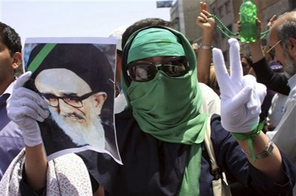Iran protest trials begin
TEHRAN: Around 20 protesters will be put on trial starting Saturday in the first prosecutions from Iran's crackdown on the opposition following disputed presidential elections last month, the state news agency reported.
The announcement comes as anger is growing over allegations of abuse against detainees from the crackdown. Reports have emerged in recent days of several young protesters who died in prison, and the opposition says authorities are torturing detainees to force confessions that can be used in trials.
Hundreds were arrested in the crackdown against protests by hundreds of thousands of Iranians, claiming fraud in the June 12 presidential vote. Among those detained were young protesters, but also senior pro-reform politicians and prominent rights activists.
The state news agency IRNA said Wednesday that indictments had been issued against "around 20" detainees involved in "planning and carrying out sabotage" and that trials will begin on Saturday. The report said this was the "first phase" of trials, and that in later phases the defendants would be "those who ordered the post election unrest," an apparent reference to opposition politicians.
The first group of defendants face charges including connections to terrorist groups, planting bombs, carrying weapons and grenades, intentional attack on the police and Basij, attacking security and university facilities, "sending images to the media of the enemy" ... and damaging public property, IRNA said.
IRNA said that among the 20 suspects are some who had contact with the Mujahedeen-e Khalq — a dissident group of Iranian exiles — and members of the Bahai faith, who are often targeted by the Iranian government.
Separately, authorities also dismantled a network of people who sent photos and video footage of the unrest to foreign media, IRNA reported. It identified two main members of the network by first names, Majid S. and Satyar E.
Earlier in June, a report said two local media photographers, Majid Saeedi and Satyar Emami, were detained. Saeedi was working as a freelance photographer and Emami was working for state-owned newspaper Jamejam.
The government has imposed strict conditions on foreign media, including barring their employees from covering protests. Opposition supporters have been sharing images and video from the unrest to the world via the Internet, though authorities are believed to be heavily monitoring Internet traffic.






